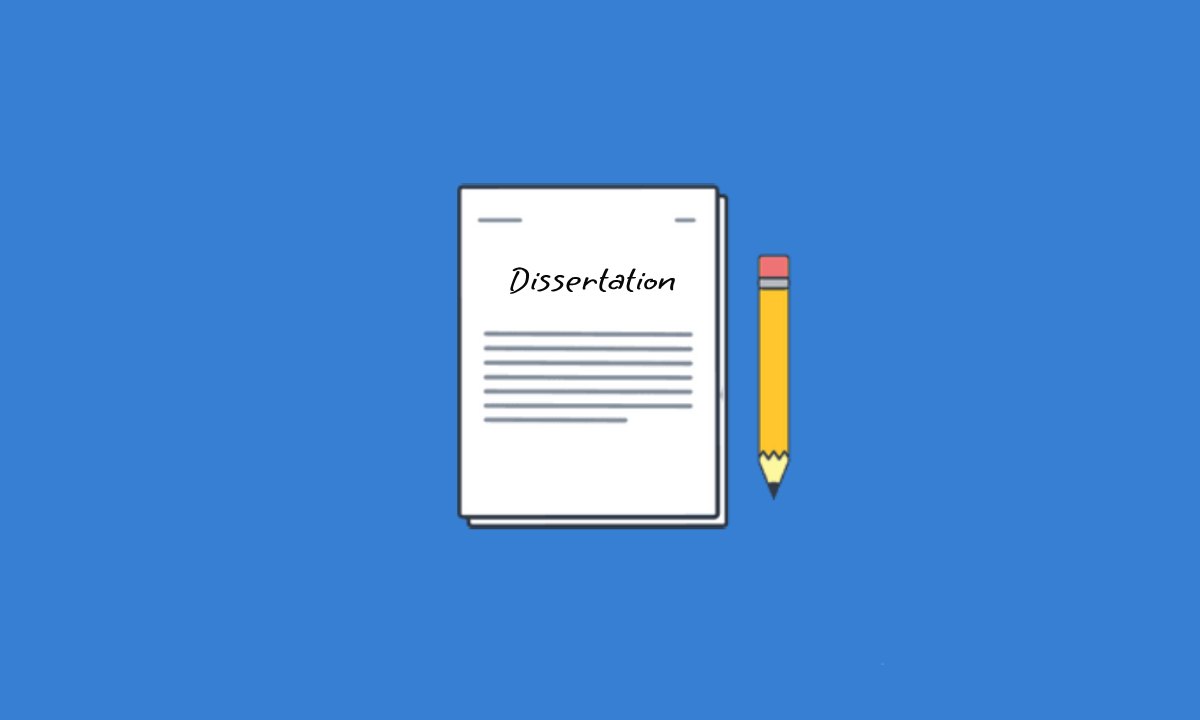- Privacy Policy

Home » Dissertation – Format, Example and Template

Dissertation – Format, Example and Template
Table of Contents
A dissertation is a significant piece of academic work that presents original research on a specific topic, often required to complete a degree. Writing a dissertation involves extensive research, critical analysis, and a thorough understanding of the subject. This guide provides an overview of the format, an example of a typical dissertation structure, and a template to guide you through the process.

Dissertation
A dissertation is a formal, structured document that reports on independent research, typically undertaken at the end of an undergraduate or postgraduate degree. Its purpose is to demonstrate the author’s ability to conduct research, analyze findings, and contribute new insights to the field.
Key Components of a Dissertation :
- Title Page : Includes the dissertation title, author’s name, institution, and date.
- Abstract : A brief summary of the research, findings, and implications.
- Acknowledgments : An optional section to thank contributors or supporters.
- Table of Contents : A list of all sections and subsections, with page numbers.
- Introduction : Introduces the topic, background, research questions, and objectives.
- Literature Review : Summarizes and analyzes existing research related to the topic.
- Methodology : Details the research design, data collection, and analysis methods.
- Results : Presents the research findings without interpretation.
- Discussion : Analyzes findings, interprets results, and compares them with existing literature.
- Conclusion : Summarizes the research, answers the research questions, and suggests implications.
- References : Lists all sources cited in the dissertation.
- Appendices : Contains supplementary materials, such as raw data or additional documentation.
Dissertation Format
A dissertation format follows a structured layout, with each chapter serving a specific purpose. Universities may have different formatting requirements, but most dissertations share a common structure.
1. Title Page
The title page is the cover of your dissertation. It should include:
- Title of the dissertation
- Author’s full name
- University name and department
- Submission date
- Supervisor’s name
2. Abstract
The abstract provides a concise summary of the research, including:
- Research question or objective
- Methodology
- Key findings
- Conclusion or implications
Example Abstract : “This study explores the impact of social media on consumer purchasing behavior. Using a mixed-methods approach, survey and interview data were collected from 300 participants. The findings indicate a positive correlation between social media usage and purchase intention, highlighting the significance of social media in influencing consumer decisions.”
3. Acknowledgments
In this optional section, you can thank anyone who contributed to the completion of the dissertation, including advisors, colleagues, friends, or family.
4. Table of Contents
The table of contents lists all main sections and subsections, providing page numbers for easy navigation.
5. Introduction
The introduction sets the context for your research, presenting:
- Background information
- The research problem or gap
- Research questions or hypotheses
- Objectives of the study
Example Introduction : “With the rapid growth of social media, consumers’ interactions with brands have fundamentally changed. This dissertation examines the relationship between social media exposure and consumer purchasing behavior, aiming to understand how platforms like Instagram and Facebook influence buying decisions.”
6. Literature Review
The literature review analyzes existing research related to your topic, focusing on:
- Relevant theories and models
- Key studies and findings
- Gaps in the literature
Example Literature Review Structure :
- Introduction to Key Theories : Overview of theories related to consumer behavior and social media influence.
- Analysis of Existing Research : Discussion of studies that explored social media’s impact on marketing.
- Identification of Gaps : Highlight areas that lack research, justifying the need for the current study.
7. Methodology
The methodology section explains your research approach, including:
- Research design (qualitative, quantitative, or mixed-methods)
- Data collection methods (surveys, interviews, experiments)
- Sampling techniques
- Data analysis techniques
Example Methodology : “A mixed-methods approach was chosen for this study. Quantitative data was collected through an online survey with 300 respondents, while qualitative data was gathered from ten in-depth interviews. The survey data was analyzed using SPSS, and interview transcripts were coded to identify themes.”
In the results section, present your findings objectively:
- Summarize key data points and patterns.
- Use tables, charts, and graphs to visualize results.
- Avoid interpreting the results here—save that for the discussion.
Example Results : “Out of the 300 survey respondents, 65% indicated that they are likely to purchase a product after seeing it on social media. Analysis also showed that younger users, particularly those aged 18-24, are more influenced by social media advertising.”
9. Discussion
The discussion section interprets your results, linking them to the research questions and literature review. This section should:
- Analyze what the results mean in the context of your research questions.
- Compare findings with previous research.
- Identify limitations and implications of your research.
Example Discussion : “The positive correlation between social media usage and purchase intention supports existing literature on digital marketing effectiveness. However, the study’s reliance on self-reported data may limit generalizability. Future research should consider longitudinal designs to explore long-term effects.”
10. Conclusion
The conclusion provides a summary of the study, covering:
- Answers to research questions
- Implications for theory, practice, or future research
Example Conclusion : “This study concludes that social media significantly influences consumer purchasing behavior, particularly among younger demographics. Businesses should consider targeted social media strategies to engage this audience effectively.”
11. References
All sources cited in the dissertation should be listed in the references section, following a specific citation style (e.g., APA, MLA, Chicago).
12. Appendices
The appendices section includes supplementary materials, such as:
- Survey questions or interview guides
- Raw data or calculations
- Additional charts, graphs, or tables
Dissertation Template
[University Name]
Dissertation Title
[Author’s Name]
[Submission Date]
- Brief summary of the research, methodology, and findings.
- Express gratitude to those who helped with the research.
- List of chapters, sections, and subsections with page numbers.
- Background, research questions, and objectives.
- Summary and analysis of relevant research, identifying gaps.
- Description of research methods, sampling, and analysis.
- Presentation of findings with tables or charts.
- Interpretation of findings, comparison with existing research.
- Summary of findings, answers to research questions, implications.
- List of all sources cited in the dissertation.
- Supplementary materials or data.
Tips for Writing a Dissertation
- Plan and Organize : Create a clear outline before you begin writing, and follow a timeline for completing each chapter.
- Use Reliable Sources : Ensure that your literature review includes credible and recent sources to strengthen your research.
- Stay Objective : Present findings objectively, without inserting personal bias.
- Edit and Proofread : Carefully review each chapter, and consider using professional editing services for the final draft.
- Follow Formatting Guidelines : Adhere to your institution’s formatting and citation guidelines to meet academic standards.
Writing a dissertation requires careful planning, thorough research, and a systematic approach to presenting findings. By following the recommended format, using a clear structure, and organizing each chapter effectively, you can create a comprehensive dissertation that showcases your research skills and knowledge.
- Murray, R. (2011). How to Write a Thesis . Open University Press.
- Ridley, D. (2012). The Literature Review: A Step-by-Step Guide for Students . Sage Publications.
- Thomas, G. (2017). How to Do Your Research Project: A Guide for Students in Education and Applied Social Sciences . Sage Publications.
- Turabian, K. L. (2013). A Manual for Writers of Research Papers, Theses, and Dissertations . University of Chicago Press.
- Creswell, J. W. (2018). Research Design: Qualitative, Quantitative, and Mixed Methods Approaches . Sage Publications.
About the author
Muhammad Hassan
Researcher, Academic Writer, Web developer
You may also like

Thesis Format – Templates and Samples

Dissertation vs Thesis – Key Differences

Future Research – Thesis Guide

Purpose of Research – Objectives and Applications

Delimitations in Research – Types, Examples and...

Thesis – Outline, Structure and Writing Guide
/images/cornell/logo35pt_cornell_white.svg" alt="dissertation definition in writing"> Cornell University --> Graduate School
Guide to writing your thesis/dissertation, definition of dissertation and thesis.
The dissertation or thesis is a scholarly treatise that substantiates a specific point of view as a result of original research that is conducted by students during their graduate study. At Cornell, the thesis is a requirement for the receipt of the M.A. and M.S. degrees and some professional master’s degrees. The dissertation is a requirement of the Ph.D. degree.
Formatting Requirement and Standards
The Graduate School sets the minimum format for your thesis or dissertation, while you, your special committee, and your advisor/chair decide upon the content and length. Grammar, punctuation, spelling, and other mechanical issues are your sole responsibility. Generally, the thesis and dissertation should conform to the standards of leading academic journals in your field. The Graduate School does not monitor the thesis or dissertation for mechanics, content, or style.
“Papers Option” Dissertation or Thesis
A “papers option” is available only to students in certain fields, which are listed on the Fields Permitting the Use of Papers Option page , or by approved petition. If you choose the papers option, your dissertation or thesis is organized as a series of relatively independent chapters or papers that you have submitted or will be submitting to journals in the field. You must be the only author or the first author of the papers to be used in the dissertation. The papers-option dissertation or thesis must meet all format and submission requirements, and a singular referencing convention must be used throughout.
ProQuest Electronic Submissions
The dissertation and thesis become permanent records of your original research, and in the case of doctoral research, the Graduate School requires publication of the dissertation and abstract in its original form. All Cornell master’s theses and doctoral dissertations require an electronic submission through ProQuest, which fills orders for paper or digital copies of the thesis and dissertation and makes a digital version available online via their subscription database, ProQuest Dissertations & Theses . For master’s theses, only the abstract is available. ProQuest provides worldwide distribution of your work from the master copy. You retain control over your dissertation and are free to grant publishing rights as you see fit. The formatting requirements contained in this guide meet all ProQuest specifications.
Copies of Dissertation and Thesis
Copies of Ph.D. dissertations and master’s theses are also uploaded in PDF format to the Cornell Library Repository, eCommons . A print copy of each master’s thesis and doctoral dissertation is submitted to Cornell University Library by ProQuest.
- QUICK LINKS
- How to enroll
- Career services
- Go to MyPhoenix
- Return to my application
- My saved programs
Dissertation 101: Tips for researching and writing a doctoral dissertation

By Elizabeth Exline
When Rose Lorenzo got close to finishing her master’s degree at University of Phoenix (UOPX), she came to a crossroads. She could walk away with her degree and focus on building her company, Lorenzo Financial , or she could scratch the itch for more academic knowledge and pursue her doctorate.
Lorenzo chose the latter. (And still managed to build her company, lay the groundwork to launch a new school and eventually get accepted to law school.)

“Although I knew what I wanted to study, I wish I had known how to choose the right topic and how to narrow that topic down before I started,” Lorenzo recalls.
Lorenzo, of course, is talking about the dissertation , that book-length document that’s both the capstone of the doctoral degree and the driving force behind a doctoral program’s years of study and academic research.
But settling on a topic is just one part of a process that can intimidate even the most determined scholar. What’s exactly involved in a dissertation? And what’s the point of one anyway? Here, we take a deeper dive into the dissertation experience.
What is a dissertation?
A dissertation is an academic document prepared by a doctoral student that contains original research about a topic. The student identifies the topic, conducts the research, writes the dissertation and defends it in front of a committee led by a dissertation chair and other doctoral faculty who decide whether the research meets the doctoral level research standards. If it does, the student will successfully complete the doctoral program, have their dissertation published in ProQuest and earn a terminal degree , which means the highest education level that can be earned in a field.
The dissertation, in other words, is important. But why all the fuss in the first place? According to Rodney Luster, PhD, a dissertation can enhance society’s overall knowledge and understanding about an issue and ignite a person’s area of interest and expertise, as well as enhance that expertise .

Luster is the chair for the Center for Leadership Studies and Organizational Research within the College of Doctoral Studies at University of Phoenix , and he points to his own dissertation by way of example.
His research concerned what is currently known as vicarious trauma, a phenomenon he witnessed among his college students after the 9/11 attacks. His students hadn’t been anywhere near the attack, and yet he noticed they displayed classic signs of trauma. This piqued his interest.
“I was able to conduct what I understand was the first research study looking at vicarious trauma in the general population, and that has opened up a lot of doors,” Luster explains.
Now an expert on the concept, he has seen the phenomenon after subsequent events, such as Hurricane Katrina.
Lorenzo’s research was more tailored to her area of interest. She ultimately whittled down her topic from how leadership impacts entrepreneurial success or failure to how it impacts female entrepreneurs specifically.

Topics, in other words, offer the freedom for students to follow their curiosity and experience with the goal of potentially solving a problem or adding to a field’s body of knowledge .
read similar articles

Practitioner doctorate vs. PhD – 5 things to know before getting started
Dissertation vs. thesis — what's the difference.
Some people may confuse a dissertation with a thesis, but they’re not the same thing. While similar in nature in that they are both the capstone of an academic program, the biggest difference is where a dissertation and a thesis fit in the educational journey. As explained, a doctoral student completes a dissertation, while a thesis is a research paper for a master’s-level student or sometimes within a bachelor’s program.
There are other differences as well. One is the level of research involved. Often, a thesis is based on existing research. This means that an undergrad or graduate student will compile various research findings to defend a theory or idea in a thesis. A dissertation on the other hand requires doctoral students to conduct, present and defend their own research.
The two documents differ in length too. A thesis is often much shorter and can range from 40 to 60 pages for an undergraduate thesis and from 60 to upward of 100 pages for a master's thesis. A dissertation is 150 to 300 pages, or 80,000 to 100,000 words. As noted, whether it’s presented in front of a panel of faculty or academics as an oral defense is another key difference. This is often required for a dissertation, but oral defense of a thesis may depend on the program or institution.

How to write a dissertation
Figuring out a dissertation topic is a process as individualized as the students in a doctoral degree program. Luster usually encourages candidates to begin with a title .
“That’s going to be your selling point for everything, and it has to be understandable. It must be concise. It must have a theoretical construct in it. The title will take you a lot of places and will help lead you into the writing process.”
To this Lorenzo adds a less lofty but equally valid cross-check: She learned to really drill down any topic with the question, “ Who cares? ” If there are people who are invested in learning more about the topic (if there are, in other words, people who care), it may warrant further research.
These preliminary exercises lay a solid foundation for the dissertation process, but the actual research and writing can still feel intimidating. Luster, for example, had written a book before starting his dissertation, and points out that a dissertation “is not like any other writing that you’ve done.”
So, where do you start? At UOPX, you start in your first class.
Understanding ACCESS
The dissertation process at UOPX was revamped and rolled out in September 2019, notes Shawn C. Todd-Boone, EdD, the associate dean for ACCESS, research and residency at the College of Doctoral Studies.

Luster says the process was reimagined based on extensive feedback and on a desire to make the process more effective and efficient.
One of the first ways the dissertation process changed was with the development of ACCESS , an acronym for “ advancing community, critical thought, engagement, scholarship and success .”
This sequence is incorporated into the first three interdisciplinary courses of any doctoral program at UOPX with an eye toward introducing doctoral candidates to what Luster calls a “theoretical mindset.”
The ACCESS program attempts to nurture a culture of inquiry that helps retain doctoral candidates while inspiring them to innovate in their fields, Boone says.
ACCESS, in other words, sets the tone for the entire doctoral process, which is founded on innovation, research and critical thinking.

The five phases of the dissertation
Writing the dissertation occurs in what Luster describes as five phases over the course of different classes. These are:
- Phase 1: Develop a prospectus , which is an outline of the research project.
- Phase 2: Draft the first chapter of the dissertation, which is known as the précis .
- Phase 3: Undergo a concept review and develop the second chapter.
- Phase 4: Focus on the proposal , write the third chapter and review chapters one through three.
- Phase 5: Obtain the approval of the Institutional Review Board , which evaluates research according to the University’s ethical standards.

Better together: How three friends made earning their doctorates a team sport
The uopx difference.
The five phases of the dissertation writing process aren’t ubiquitous. Doctoral students work on a dissertation while going through the program at UOPX — which was very much intentional, according to Boone.
“We have five phases in the dissertation process and a deliverable at the end of each phase to encourage students to finish and to complete on time if they commit to the process,” Boone explains.
This is a notable improvement, according to Lorenzo. “It is more effective to start your research on day one than wait, because it's easier to identify the gap in research and eliminate wasted research time on topics that are not relevant to your study, and [it] helps contribute to the literature review of the study,” she says.

But this process isn’t the only benefit UOPX students enjoy. The doctoral program has several other distinctive features:
- Once upon a time, students interviewed potential research chairs to take on the oversight of their program. The result was stressful, with doctoral candidates often casting a wide net in the hope of securing a chair and then potentially ending up with someone who wasn’t quite the perfect fit. Today, UOPX takes the stress and potential mismatch out of the equation. “Students do not search for dissertation committee members ,” Boone says. “We assign them.”
- Dissertations from UOPX tend to focus on functional application more so than just theory, Luster notes. This means topics have real-world applications, and communities and industries may benefit from the research. For example, one recent dissertation explored the integration of nurse graduates into hospital settings during COVID-19.
- Doctoral candidates have access to diverse and extensive resources . In addition to comprehensive documentation about the dissertation process at UOPX, candidates can leverage one-on-one appointments with the University’s library staff, engage in workshops with research chairs and seek opportunities to work as research assistants.
- Rather than what Luster calls a sink-or-swim approach, UOPX has invested in a mentor-driven approach . “I think that makes us largely different and successful with students, especially adult learners,” Luster says.
In the end, that sense of a safety net — both in terms of mentorship and the doctoral community itself — is one of the biggest reassurances doctoral candidates enjoy.
Lorenzo, for example, keeps in touch with a core group of colleagues she met through the program. “No one understands what you’re going through except for [your peers],” she notes.
Or, as Luster puts it: “You don’t have to worry, because you’ll acquire this information along the way, and you have a lot of good people to help you.”

How long is a doctoral dissertation?
Most are 100 to 300 pages and organized by chapters and/or sections and subsections. There are also often requirements for text size, page size and spacing that can depend on your doctoral program.
What are the parts of a dissertation?
A dissertation generally includes a Dissertation Acceptance Certificate, a title page, a copyright statement, an abstract (detailing the objective of the research, the methods and the outcome), a table of contents, the research itself and supplemental information (either as an appendix with charts and tables or as an uploaded file with digital information). Some dissertations include front and back matter, such as acknowledgments, a dedication, a glossary, a bibliography and related features.
Is a dissertation required for a doctorate?
Not always. While most doctoral and PhD degree programs require a dissertation, some don’t, and others require a capstone project.
What's the difference between a PhD and a doctorate?
Individuals who complete a PhD focus on producing new knowledge to contribute to a theory or body of research. Individuals who complete a practitioner doctorate , on the other hand, focuses on how to apply knowledge to a field or particular issue.
want to read more like this?

Get Mentally Fit with Critical Thinking
University life.
July 24, 2023 • 6 minutes

Alumni Mentor Program Paves the Way for Future Success of Doctoral Students
January 02, 2023 • 7 minutes

What is a Scholarly Source?
January 26, 2022 • 6 Minutes

- Harvard Library
- Research Guides
- Harvard Graduate School of Design - Frances Loeb Library
Write and Cite
- Theses and Dissertations
- Academic Integrity
- Using Sources and AI
- Academic Writing
- From Research to Writing
- GSD Writing Services
- Grants and Fellowships
- Reading, Notetaking, and Time Management
What is a thesis?
What is a dissertation, getting started, staying on track, thesis abstract, lit(erature) review.
A thesis is a long-term project that you work on over the course of a semester or a year. Theses have a very wide variety of styles and content, so we encourage you to look at prior examples and work closely with faculty to develop yours.
Before you begin, make sure that you are familiar with the dissertation genre—what it is for and what it looks like.
Generally speaking, a dissertation’s purpose is to prove that you have the expertise necessary to fulfill your doctoral-degree requirements by showing depth of knowledge and independent thinking.
The form of a dissertation may vary by discipline. Be sure to follow the specific guidelines of your department.
- PhD This site directs candidates to the GSAS website about dissertations , with links to checklists, planning, formatting, acknowledgments, submission, and publishing options. There is also a link to guidelines for the prospectus . Consult with your committee chair about specific requirements and standards for your dissertation.
- DDES This document covers planning, patent filing, submission guidelines, publishing options, formatting guidelines, sample pages, citation guidelines, and a list of common errors to avoid. There is also a link to guidelines for the prospectus .
- Scholarly Pursuits (GSAS) This searchable booklet from Harvard GSAS is a comprehensive guide to writing dissertations, dissertation-fellowship applications, academic journal articles, and academic job documents.
Finding an original topic can be a daunting and overwhelming task. These key concepts can help you focus and save time.
Finding a topic for your thesis or dissertation should start with a research question that excites or at least interests you. A rigorous, engaging, and original project will require continuous curiosity about your topic, about your own thoughts on the topic, and about what other scholars have said on your topic. Avoid getting boxed in by thinking you know what you want to say from the beginning; let your research and your writing evolve as you explore and fine-tune your focus through constant questioning and exploration.
Get a sense of the broader picture before you narrow your focus and attempt to frame an argument. Read, skim, and otherwise familiarize yourself with what other scholars have done in areas related to your proposed topic. Briefly explore topics tangentially related to yours to broaden your perspective and increase your chance of finding a unique angle to pursue.
Critical Reading
Critical reading is the opposite of passive reading. Instead of merely reading for information to absorb, critical reading also involves careful, sustained thinking about what you are reading. This process may include analyzing the author’s motives and assumptions, asking what might be left out of the discussion, considering what you agree with or disagree with in the author’s statements and why you agree or disagree, and exploring connections or contradictions between scholarly arguments. Here is a resource to help hone your critical-reading skills:
https://guides.library.harvard.edu/sixreadinghabits
https://youtu.be/BcV64lowMIA
Conversation
Your thesis or dissertation will incorporate some ideas from other scholars whose work you researched. By reading critically and following your curiosity, you will develop your own ideas and claims, and these contributions are the core of your project. You will also acknowledge the work of scholars who came before you, and you must accurately and fairly attribute this work and define your place within the larger discussion. Make sure that you know how to quote, summarize, paraphrase , integrate , and cite sources to avoid plagiarism and to show the depth and breadth of your knowledge.
A thesis is a long-term, large project that involves both research and writing; it is easy to lose focus, motivation, and momentum. Here are suggestions for achieving the result you want in the time you have.
The dissertation is probably the largest project you have undertaken, and a lot of the work is self-directed. The project can feel daunting or even overwhelming unless you break it down into manageable pieces and create a timeline for completing each smaller task. Be realistic but also challenge yourself, and be forgiving of yourself if you miss a self-imposed deadline here and there.
Your program will also have specific deadlines for different requirements, including establishing a committee, submitting a prospectus, completing the dissertation, defending the dissertation, and submitting your work. Consult your department’s website for these dates and incorporate them into the timeline for your work.
Accountability
Sometimes self-imposed deadlines do not feel urgent unless there is accountability to someone beyond yourself. To increase your motivation to complete tasks on schedule, set dates with your committee chair to submit pre-determined pieces of a chapter. You can also arrange with a fellow doctoral student to check on each other’s progress. Research and writing can be lonely, so it is also nice to share that journey with someone and support each other through the process.
Common Pitfalls
The most common challenges for students writing a dissertation are writer’s block, information-overload, and the compulsion to keep researching forever.
There are many strategies for avoiding writer’s block, such as freewriting, outlining, taking a walk, starting in the middle, and creating an ideal work environment for your particular learning style. Pay attention to what helps you and try different things until you find what works.
Efficient researching techniques are essential to avoiding information-overload. Here are a couple of resources about strategies for finding sources and quickly obtaining essential information from them.
https://owl.purdue.edu/owl/subject_specific_writing/writing_in_literature/writing_in_literature_detailed_discussion/reading_criticism.html
https://students.dartmouth.edu/academic-skills/learning-resources/learning-strategies/reading-techniques
Finally, remember that there is always more to learn and your dissertation cannot incorporate everything. Follow your curiosity but also set limits on the scope of your work. It helps to create a folder entitled “future projects” for topics and sources that interest you but that do not fit neatly into the dissertation. Also remember that future scholars will build off of your work, so leave something for them to do.
An abstract is a short (approximately 200-word) summary or overview of your research project. It provides enough information for a reader to know what they will find within the larger document, such as your purpose, methodology, and results or conclusion. It may also include a list of keywords. An abstract is an original document, not an excerpt, and its contents and organization may vary by discipline.
A literature review establishes a set of themes and contexts drawn from foundational research and materials that relate to your project. It is an acknowledgment that your scholarship doesn’t exist in a vacuum. With the review, you identify patterns and trends in the literature to situate your contribution within the existing scholarly conversation.
What is a literature review? A literature review (or lit review, for short) is a critical analysis of published scholarly research (the "literature") related to a specific topic. Literature here means body of work, which traditionally was done in written form and may include journal articles, books, book chapters, dissertations and thesis, or conference proceedings. In the case of design, however, literature has an expanded breadth since the body of work is oftentimes not represented by words. A design review may include plans, sections, photographs, and any type of media that portrays the work.
A literature review may stand on its own or may be inside a larger work, usually in the introductory sections. It is thorough but not exhaustive--there will always be more information than you can reasonably locate and include. Be mindful of your scope and time constraints and select your reviewed materials with care. A literature review
- summarizes the themes and findings of works in an area
- compares and contrasts relevant aspects of literature on a topic
- critically assesses the strengths and omissions of the source material
- elaborates on the implications of their findings for one's own research topic
What does a literature review look like? Each discipline has its own style for writing a literature review; urban planning and design lit reviews may look different than those from architecture, and design lit reviews will look significantly different than reviews from the biological sciences or engineering. Look at published journal articles within your field and note how they present the information.
- Introduction: most scholarly articles and books will have a literature review within the introductory sections. Its precise location may vary, but it is most often in the first few paragraphs or pages.
Dedicated literature reviews: these are stand-alone resources unto themselves. You can search for "literature review" and a topic, and you may find that one already exists. These literature reviews are useful as models within your field, for finding additional sources to explore, and for beginning to map the general relationships within the scholarly conversation around your topic. Be mindful not to plagiarize the source material.
Database search tip : Add the phrase "literature review" to your search to find published literature reviews.
Browsing through theses and dissertations of the past can help to get a sense of your options and gain inspiration but be careful to use current guidelines and refer to your committee instead of relying on these examples for form or formatting.
Theses at the Frances Loeb Library is a research guide to finding p ast GSD theses.
DASH Digital Access to Scholarship at Harvard.
HOLLIS Harvard Library’s catalog provides access to ProQuest Dissertations & Theses Global .
MIT Architecture has a list of their graduates’ dissertations and theses.
Rhode Island School of Design has a list of their graduates’ dissertations and theses.
University of South Florida has a list of their graduates’ dissertations and theses.
Harvard GSD has a list of projects, including theses and professors’ research.
- << Previous: Reading, Notetaking, and Time Management
- Next: Publishing >>
- Last Updated: Dec 16, 2024 5:26 PM
- URL: https://guides.library.harvard.edu/gsd/write
Harvard University Digital Accessibility Policy

🚀 Work With Us
Private Coaching
Language Editing
Qualitative Coding
✨ Free Resources
Templates & Tools
Short Courses
Articles & Videos
What Exactly Is A Dissertation (Or Thesis)?
If you’ve landed on this article, chances are you’ve got a dissertation or thesis project coming up (hopefully it’s not due next week!), and you’re now asking yourself the classic question, “what the #%#%^ is a dissertation?”…
In this post, I’ll break down the basics of exactly what a dissertation is, in plain language. No ivory tower academia.
So, let’s get to the pressing question – what is a dissertation?
A dissertation (or thesis) = a research project
Simply put, a dissertation (or thesis – depending on which country you’re studying in) is a research project . In other words, your task is to ask a research question (or set of questions) and then set about finding the answer(s). Simple enough, right?
Well, the catch is that you’ve got to undertake this research project in an academic fashion , and there’s a wealth of academic language that makes it all (look) rather confusing (thanks, academia). However, at its core, a dissertation is about undertaking research (investigating something). This is really important to understand, because the key skill that your university is trying to develop in you (and will be testing you on) is your ability to undertake research in a well-structured structured, critical and academically rigorous way.
This research-centric focus is significantly different from assignments or essays, where the main concern is whether you can understand and apply the prescribed module theory. I’ll explain some other key differences between dissertations or theses and assignments a bit later in this article, but for now, let’s dig a little deeper into what a dissertation is.
A dissertation (or thesis) is a process.
Okay, so now that you understand that a dissertation is a research project (which is testing your ability to undertake quality research), let’s go a little deeper into what that means in practical terms.
The best way to understand a dissertation is to view it as a process – more specifically a research process (it is a research project, after all). This process involves four essential steps, which I’ll discuss below.

Step 1 – You identify a worthy research question
The very first step of the research process is to find a meaningful research question, or a set of questions. In other words, you need to find a suitable topic for investigation. Since a dissertation is all about research, identifying the key question(s) is the critical first step. Here’s an example of a well-defined research question:
“Which factors cultivate or erode customer trust in UK-based life insurance brokers?”
This clearly defined question sets the direction of the research . From the question alone, you can understand exactly what the outcome of the research might look like – i.e. a set of findings about which factors help brokers develop customer trust, and which factors negatively impact trust.
But how on earth do I find a suitable research question, you ask? Don’t worry about this right now – when you’re ready, you can read our article about finding a dissertation topic . However, right now, the important thing to understand is that the first step in the dissertation process is identifying the key research question(s). Without a clear question, you cannot move forward.
Step 2 – You review the existing research
Once the research question is clearly established, the next step is to review the existing research/literature (both academic and professional/industry) to understand what has already been said with regard to the question. In academic speak, this is called a literature review .
This step is critically important as, in all likelihood, someone else has asked a similar question to yours, and therefore you can build on the work of others . Good academic research is not about reinventing the wheel or starting from scratch – it’s about familiarising yourself with the current state of knowledge, and then using that as your basis for further research.
Simply put, the first step to answering your research question is to look at what other researchers have to say about it. Sometimes this will lead you to change your research question or direction slightly (for example, if the existing research already provides a comprehensive answer). Don’t stress – this is completely acceptable and a normal part of the research process.
Step 3 – You carry out your own research
Once you’ve got a decent understanding of the existing state of knowledge, you will carry out your own research by collecting and analysing the relevant data. This could take to form of primary research (collecting your own fresh data), secondary research (synthesising existing data) or both, depending on the nature of your degree, research question(s) and even your university’s specific requirements.
Exactly what data you collect and how you go about analysing it depends largely on the research question(s) you are asking, but very often you will take either a qualitative approach (e.g. interviews or focus groups) or a quantitative approach (e.g. online surveys). In other words, your research approach can be words-based, numbers-based, or both . Don’t let the terminology scare you and don’t worry about these technical details for now – we’ll explain research methodology in later posts .
Step 4 – You develop answers to your research question(s)
Combining your understanding of the existing research (Step 2) with the findings from your own original research (Step 3), you then (attempt to) answer your original research question (s). The process of asking, investigating and then answering has gone full circle.

Of course, your research won’t always provide rock-solid answers to your original questions, and indeed you might find that your findings spur new questions altogether. Don’t worry – this is completely acceptable and is a natural part of the research process.
So, to recap, a dissertation is best understood as a research process, where you are:
- Ask a meaningful research question(s)
- Carry out the research (both existing research and your own)
- Analyse the results to develop an answer to your original research question(s).

Depending on your specific degree and the way your university designs its coursework, you might be asking yourself “but isn’t this just a longer version of a normal assignment?”. Well, it’s quite possible that your previous assignments required a similar research process, but there are some key differences you need to be aware of, which I’ll explain next.
Same same, but different…
While there are, naturally, similarities between dissertations/theses and assignments, its important to understand the differences so that you approach your dissertation with the right mindset and focus your energy on the right things. Here, I’ll discuss four ways in which writing a dissertation differs substantially from assignments and essays, and why this matters.
Difference #1 – You must decide (and live with) the direction.
Unlike assignments or essays, where the general topic is determined for you, for your dissertation, you will (typically) be the one who decides on your research questions and overall direction. This means that you will need to:
- Find a suitable research question (or set of questions)
- Justify why its worth investigating (in the form of a research proposal )
- Find all the relevant existing research and familiarise yourself with the theory
This is very different from assignments, where the theory is given to you on a platter, and the direction is largely pre-defined. Therefore, before you start the dissertation process, you need to understand the basics of academic research, how to find a suitable research topic and how to source the relevant literature.

Difference #2 – It’s a long project, and you’re on your own.
A dissertation is a long journey, at least compared to assignments. Typically, you will spend 3 – 6 months writing around 15,000 – 25,000 words (for Masters-level, much more for PhD) on just one subject. Therefore, successfully completing your dissertation requires a substantial amount of stamina .
To make it even more challenging, your classmates will not be researching the same thing as you are, so you have limited support, other than your supervisor (who may be very busy). This can make it quite a lonely journey . Therefore, you need a lot of self-discipline and self-direction in order to see it through to the end. You should also try to build a support network of people who can help you through the process (perhaps alumni, faculty or a private coach ).
Difference #3 – They’re testing research skills.
We touched on this earlier. Unlike assignments or essays, where the markers are assessing your ability to understand and apply the theories, models and frameworks that they provide you with, your dissertation will be is assessing your ability to undertake high-quality research in an academically rigorous manner.
Of course, your ability to understand the relevant theory (i.e. within your literature review) is still very important, but this is only one piece of the research skills puzzle. You need to demonstrate the full spectrum of research skills.
It’s important to note that your research does not need to be ground-breaking, revolutionary or world-changing – that is not what the markers are assessing. They are assessing whether you can apply well-established research principles and skills to a worthwhile topic of enquiry. Don’t feel like you need to solve the world’s major problems. It’s simply not going to happen (you’re a first-time researcher, after all) – and doesn’t need to happen in order to earn good marks.
Difference #4 – Your focus needs to be narrow and deep.
In your assignments, you were likely encouraged to take a broad, interconnected, high-level view of the theory and connect as many different ideas and concepts as possible. In your dissertation, however, you typically need to narrow your focus and go deep into one particular topic. Think about the research question we looked at earlier:
The focus is intentionally very narrow – specifically the focus is on:
- The UK only – no other countries are being considered.
- Life insurance brokers only – not financial services, not vehicle insurance, not medical insurance, etc.
- Customer trust only – not reputation, not customer loyalty, not employee trust, supplier trust, etc.
By keeping the focus narrow, you enable yourself to deeply probe whichever topic you choose – and this depth is essential for earning good marks. Importantly, ringfencing your focus doesn’t mean ignoring the connections to other topics – you should still acknowledge all the linkages, but don’t get distracted – stay focused on the research question(s).

So, as you can see, a dissertation is more than just an extended assignment or essay. It’s a unique research project that you (and only you) must lead from start to finish. The good news is that, if done right, completing your dissertation will equip you with strong research skills, which you will most certainly use in the future, regardless of whether you follow an academic or professional path.
Wrapping up
Hopefully in this post, I’ve answered your key question, “what is a dissertation?”, at least at a big picture-level. To recap on the key points:
- A dissertation is simply a structured research project .
- It’s useful to view a dissertation as a process involving asking a question, undertaking research and then answering that question.
- First and foremost, your marker(s) will be assessing your research skills , so its essential that you focus on producing a rigorous, academically sound piece of work (as opposed to changing the world or making a scientific breakthrough).
- While there are similarities, a dissertation is different from assignments and essays in multiple ways. It’s important to understand these differences if you want to produce a quality dissertation.
In this post, I’ve gently touched on some of the intricacies of the dissertation, including research questions, data types and research methodologies. Be sure to check out the Grad Coach Blog for more detailed discussion of these areas.
36 Comments
Hello Derek
Yes, I struggle with literature review and am highly frustrated (with myself).
Thank you for the guide that you have sent, especially the apps. I am working through the guide and busy with the implementation of it.
Hope to hear from you again!
Regards Micheal
Great to hear that, Michael. All the best with your research!
Very useful and clear information.
Thank you. That was quite something to move forward with. Despite the fact that I was lost. I will now be able to do something with the information given.
That’s great, Pheladi. Good luck!
Thank you so much for your videos and writing research proposal and dissertation. These videos are useful. I was struggling, but now I am starting to write. I hope to watch your more videos to learn more about the dissertation.
Before this post, I didn’t know where to start my research, today I have some light and do certain % of my research. I may need for direction on literature review. Big thanks to you.
Very very good Derek
Thanks immensely Derek
You’re welcome 🙂 Good luck with your dissertation/thesis.
Thank you Derek for widening my scope on research, this can be likened to a blind man whose eyes can now see.
Remain bless sir🙏
You guys are doing really great… I am extremely grateful for your help… Keep going.. Please activate that research help for indian students as well I couldn’t access it being an indian.
Hello Derek,
I got stuck in the concept paper because I changed my topic. Now I don’t know where to pick up the pieces again. How can I focus and stay on track. I am getting scared.
Thank you so much Derek, I am a new comer, learning for the first time how to write a good research. These in information’s to me is a mind opener, I hope to learn more from you in the future, Thanks and God bless.
Thanks Guys this means so much to me
A pretty good and insightful piece for beginners like me. Looking forward to more helpful hints and guide. Thanks to Derek.
This is so helpful…really appreciate your work.
Great to hear that
On cybersecurity Analytics research to banking transactions
This was of great help to me and quite informative .
Thank you so much GradCoach,
This is like a light at the end of the tunnel. You are a lifesaver. Thank you once again.
hello, I’m so grateful for such great information. It appears basic, but it is so relevant in understanding the research process.
Your website is very helpful for writing thesis. A big well done to the team. Do you have a website for paper writing and academic publishing or how to publish my thesis, how to land a fully funded PhD, etc. Just the general upward trajectory in the academia. Thank you
I have learned a lot from the lectures, it was beneficial and helped me a lot in my research journey. Thank you very much
Thank you for your gifts of enlightenment to a person like me who’s always a student. May your ‘well’not dry out.
It’s quite a fun and superb, now I have come to believe that the way one teach can have an impact in understanding and can change one’s assumption and position about a subject or a problem, before I came here and learn I consider research methodology a hard thing because, I wasn’t taught by a mentor like this one. Thanks so much who ever have make this effort to make this something easy and engaging
I can’t imagine that world has achieved major aspects of every field of study
Thank you very much for all the valuable, wonderful and comprehensive amount of information… I highly appreciate your support, 100% I recommend you
This topic is intended for my MPhil. Work (The perception of parents on Technical and Vocational Education, the impact on educational policy). May you consider the suitability of the topic for me and refine if the need be. Thank you,
Hello here…
i have gone through the notes and it is interesting. All i need now is a pdf file that contain a whole dissertation writing inclusive of chapter 1 to 5 on motivation as a topic… thanks
Remarkable!!! You made it sound so simple
I got stuck in my writing because I need to change my topic. I am getting scared as I have a semester left 🙁
Thanks for such an educational opportunity and support
Thanks for your educational opportunity and support
Could you please share me with the App. to use for literature review
Submit a Comment Cancel reply
Your email address will not be published. Required fields are marked *
Save my name, email, and website in this browser for the next time I comment.
- Print Friendly
- How it works
"Christmas Offer"
Terms & conditions.
As the Christmas season is upon us, we find ourselves reflecting on the past year and those who we have helped to shape their future. It’s been quite a year for us all! The end of the year brings no greater joy than the opportunity to express to you Christmas greetings and good wishes.
At this special time of year, Research Prospect brings joyful discount of 10% on all its services. May your Christmas and New Year be filled with joy.
We are looking back with appreciation for your loyalty and looking forward to moving into the New Year together.
"Claim this offer"
In unfamiliar and hard times, we have stuck by you. This Christmas, Research Prospect brings you all the joy with exciting discount of 10% on all its services.
Offer valid till 5-1-2024
We love being your partner in success. We know you have been working hard lately, take a break this holiday season to spend time with your loved ones while we make sure you succeed in your academics
Discount code: RP0996Y

Your content here...

A Step-By-Step Guide to Write the Perfect Dissertation
“A dissertation or a thesis is a long piece of academic writing based on comprehensive research.”
The significance of dissertation writing in the world of academia is unparalleled. A good dissertation paper needs months of research and marks the end of your respected academic journey. It is considered the most effective form of writing in academia and perhaps the longest piece of academic writing you will ever have to complete.
This thorough step-by-step guide on how to write a dissertation will serve as a tool to help you with the task at hand, whether you are an undergraduate student or a Masters or PhD student working on your dissertation project. This guide provides detailed information about how to write the different chapters of a dissertation, such as a problem statement , conceptual framework , introduction , literature review, methodology , discussion , findings , conclusion , title page , acknowledgements , etc.
What is a Dissertation? – Definition
Before we list the stages of writing a dissertation, we should look at what a dissertation is.
The Cambridge dictionary states that a dissertation is a long piece of writing on a particular subject, especially one that is done to receive a degree at college or university, but that is just the tip of the iceberg because a dissertation project has a lot more meaning and context.
To understand a dissertation’s definition, one must have the capability to understand what an essay is. A dissertation is like an extended essay that includes research and information at a much deeper level. Despite the few similarities, there are many differences between an essay and a dissertation.
Another term that people confuse with a dissertation is a thesis. Let's look at the differences between the two terms.

What is the Difference Between a Dissertation and a Thesis?
Dissertation and thesis are used interchangeably worldwide (and may vary between universities and regions), but the key difference is when they are completed. The thesis is a project that marks the end of a degree program, whereas the dissertation project can occur during the degree. Hanno Krieger (Researchgate, 2014) explained the difference between a dissertation and a thesis as follows:
“Thesis is the written form of research work to claim an academic degree, like PhD thesis, postgraduate thesis, and undergraduate thesis. On the other hand, a dissertation is only another expression of the written research work, similar to an essay. So the thesis is the more general expression.
In the end, it does not matter whether it is a bachelor's, master or PhD dissertation one is working on because the structure and the steps of conducting research are pretty much identical. However, doctoral-level dissertation papers are much more complicated and detailed.
Problems Students Face When Writing a Dissertation
You can expect to encounter some troubles if you don’t yet know the steps to write a dissertation. Even the smartest students are overwhelmed by the complexity of writing a dissertation.
A dissertation project is different from any essay paper you have ever committed to because of the details of planning, research and writing it involves. One can expect rewarding results at the end of the process if the correct guidelines are followed. Still, as indicated previously, there will be multiple challenges to deal with before reaching that milestone.
The three most significant problems students face when working on a dissertation project are the following.
Poor Project Planning
Delaying to start working on the dissertation project is the most common problem. Students think they have sufficient time to complete the paper and are finding ways to write a dissertation in a week, delaying the start to the point where they start stressing out about the looming deadline. When the planning is poor, students are always looking for ways to write their dissertations in the last few days. Although it is possible, it does have effects on the quality of the paper.
Inadequate Research Skills
The writing process becomes a huge problem if one has the required academic research experience. Professional dissertation writing goes well beyond collecting a few relevant reference resources.
You need to do both primary and secondary research for your paper. Depending on the dissertation’s topic and the academic qualification you are a candidate for, you may be required to base your dissertation paper on primary research.
In addition to secondary data, you will also need to collect data from the specified participants and test the hypothesis . The practice of primary collection is time-consuming since all the data must be analysed in detail before results can be withdrawn.
Failure to Meet the Strict Academic Writing Standards
Research is a crucial business everywhere. Failure to follow the language, style, structure, and formatting guidelines provided by your department or institution when writing the dissertation paper can worsen matters. It is recommended to read the dissertation handbook before starting the write-up thoroughly.
Steps of Writing a Dissertation
For those stressing out about developing an extensive paper capable of filling a gap in research whilst adding value to the existing academic literature—conducting exhaustive research and analysis—and professionally using the knowledge gained throughout their degree program, there is still good news in all the chaos.
We have put together a guide that will show you how to start your dissertation and complete it carefully from one stage to the next.
Find an Interesting and Manageable Dissertation Topic
A clearly defined topic is a prerequisite for any successful independent research project. An engaging yet manageable research topic can produce an original piece of research that results in a higher academic score.
Unlike essays or assignments, when working on their thesis or dissertation project, students get to choose their topic of research.
You should follow the tips to choose the correct topic for your research to avoid problems later. Your chosen dissertation topic should be narrow enough, allowing you to collect the required secondary and primary data relatively quickly.
Understandably, many people take a lot of time to search for the topic, and a significant amount of research time is spent on it. You should talk to your supervisor or check out the intriguing database of ResearchProspect’s free topics for your dissertation.
Alternatively, consider reading newspapers, academic journals, articles, course materials, and other media to identify relevant issues to your study area and find some inspiration to get going.
You should work closely with your supervisor to agree to a narrowed but clear research plan.Here is what Michelle Schneider, learning adviser at the University of Leeds, had to say about picking the research topics,
“Picking something you’re genuinely interested in will keep you motivated. Consider why it’s important to tackle your chosen topic," Michelle added.
Develop a First-Class Dissertation Proposal.
Once the research topic has been selected, you can develop a solid dissertation proposal . The research proposal allows you to convince your supervisor or the committee members of the significance of your dissertation.
Through the proposal, you will be expected to prove that your work will significantly value the academic and scientific communities by addressing complex and provocative research questions .
Dissertation proposals are much shorter but follow a similar structure to an extensive dissertation paper. If the proposal is optional in your university, you should still create one outline of the critical points that the actual dissertation paper will cover. To get a better understanding of dissertation proposals, you can also check the publicly available samples of dissertation proposals .
Typical contents of the dissertation paper are as follows;
- A brief rationale for the problem your dissertation paper will investigate.
- The hypothesis you will be testing.
- Research objectives you wish to address.
- How will you contribute to the knowledge of the scientific and academic community?
- How will you find answers to the critical research question(s)?
- What research approach will you adopt?
- What kind of population of interest would you like to generalise your result(s) to (especially in the case of quantitative research)?
- What sampling technique(s) would you employ, and why would you not use other methods?
- What ethical considerations have you taken to gather data?
- Who are the stakeholders in your research are/might be?
- What are the future implications and limitations you see in your research?
Let’s review the structure of the dissertation. Keep the format of your proposal simple. Keeping it simple keeps your readers will remain engaged. The following are the fundamental focal points that must be included:
Title of your dissertation: Dissertation titles should be 12 words in length. The focus of your research should be identifiable from your research topic.
Research aim: The overall purpose of your study should be clearly stated in terms of the broad statements of the desired outcomes in the Research aim. Try and paint the picture of your research, emphasising what you wish to achieve as a researcher.
Research objectives: The key research questions you wish to address as part of the project should be listed. Narrow down the focus of your research and aim for at most four objectives. Your research objectives should be linked with the aim of the study or a hypothesis.
Literature review: Consult with your supervisor to check if you are required to use any specific academic sources as part of the literature review process. If that is not the case, find out the most relevant theories, journals, books, schools of thought, and publications that will be used to construct arguments in your literature research.Remember that the literature review is all about giving credit to other authors’ works on a similar topic
Research methods and techniques: Depending on your dissertation topic, you might be required to conduct empirical research to satisfy the study’s objectives. Empirical research uses primary data such as questionnaires, interview data, and surveys to collect.
On the other hand, if your dissertation is based on secondary (non-empirical) data, you can stick to the existing literature in your area of study. Clearly state the merits of your chosen research methods under the methodology section.
Expected results: As you explore the research topic and analyse the data in the previously published papers, you will begin to build your expectations around the study’s potential outcomes. List those expectations here.
Project timeline: Let the readers know exactly how you plan to complete all the dissertation project parts within the timeframe allowed. You should learn more about Microsoft Project and Gantt Charts to create easy-to-follow and high-level project timelines and schedules.
References: The academic sources used to gather information for the proposed paper will be listed under this section using the appropriate referencing style. Ask your supervisor which referencing style you are supposed to follow.
The proposals we write have:
- Precision and Clarity
- Zero Plagiarism
- High-level Encryption
- Authentic Sources

Investigation, Research and Data Collection
This is the most critical stage of the dissertation writing process. One should use up-to-date and relevant academic sources that are likely to jeopardise hard work.
Finding relevant and highly authentic reference resources is the key to succeeding in the dissertation project, so it is advised to take your time with this process. Here are some of the things that should be considered when conducting research.
dissertation project, so it is advised to take your time with this process. Here are some of the things that should be considered when conducting research.
You cannot read everything related to your topic. Although the practice of reading as much material as possible during this stage is rewarding, it is also imperative to understand that it is impossible to read everything that concerns your research.
This is true, especially for undergraduate and master’s level dissertations that must be delivered within a specific timeframe. So, it is important to know when to stop! Once the previous research and the associated limitations are well understood, it is time to move on.
However, review at least the salient research and work done in your area. By salient, we mean research done by pioneers of your field. For instance, if your topic relates to linguistics and you haven’t familiarised yourself with relevant research conducted by, say, Chomsky (the father of linguistics), your readers may find your lack of knowledge disconcerting.
So, to come off as genuinely knowledgeable in your own field, at least don’t forget to read essential works in the field/topic!
Use an Authentic Research database to Find References.
Most students start the reference material-finding process with desk-based research. However, this research method has its own limitation because it is a well-known fact that the internet is full of bogus information and fake information spreads fasters on the internet than truth does .
So, it is important to pick your reference material from reliable resources such as Google Scholar , Researchgate, Ibibio and Bartleby . Wikipedia is not considered a reliable academic source in the academic world, so it is recommended to refrain from citing Wikipedia content.Never underrate the importance of the actual library. The supporting staff at a university library can be of great help when it comes to finding exciting and reliable publications.
Record as you learn
All information and impressions should be recorded as notes using online tools such as Evernote to make sure everything is clear. You want to retain an important piece of information you had planned to present as an argument in the dissertation paper.
Write a Flawless Dissertation
Start to write a fantastic dissertation immediately once your proposal has been accepted and all the necessary desk-based research has been conducted. Now we will look at the different chapters of a dissertation in detail. You can also check out the samples of dissertation chapters to fully understand the format and structures of the various chapters.
Dissertation Introduction Chapter
The introduction chapter of the dissertation paper provides the background, problem statement and research questions. Here, you will inform the readers why it was important for this research to be conducted and which key research question(s) you expect to answer at the end of the study.
Definitions of all the terms and phrases in the project are provided in this first chapter of the dissertation paper. The research aim and objectives remain unchanged from the proposal paper and are expected to be listed under this section.
Dissertation Literature Review Chapter
This chapter allows you to demonstrate to your readers that you have done sufficient research on the chosen topic and understand previous similar studies’ findings. Any research limitations that your research incorporates are expected to be discussed in this section.
And make sure to summarise the viewpoints and findings of other researchers in the dissertation literature review chapter. Show the readers that there is a research gap in the existing work and your job is relevant to it to justify your research value.
Dissertation Methodology
The methodology chapter of the dissertation provides insight into the methods employed to collect data from various resources and flows naturally from the literature review chapter.Simply put, you will be expected to explain what you did and how you did it, helping the readers understand that your research is valid and reliable. When writing the methodology chapter for the dissertation, make sure to emphasise the following points:
- The type of research performed by the researcher
- Methods employed to gather and filter information
- Techniques that were chosen for analysis
- Materials, tools and resources used to conduct research (typically for empirical research dissertations)
- Limitations of your chosen methods
- Reliability and validity of your measuring tools and instruments (e.g. a survey questionnaire) are also typically mentioned within the mythology section. If you used a pre-existing data collection tool, cite its reliability/validity estimates here, too.Make use of the past tense when writing the methodology chapter.
Dissertation Findings
The key results of your research are presented in the dissertation findings chapter . It gives authors the ability to validate their own intellectual and analytical skills
Dissertation Conclusion
Cap off your dissertation paper with a study summary and a brief report of the findings. In the concluding chapter , you will be expected to demonstrate how your research will provide value to other academics in your area of study and its implications.It is recommended to include a short ‘recommendations’ section that will elaborate on the purpose and need for future research to elucidate the topic further.
Follow the referencing style following the requirements of your academic degree or field of study. Make sure to list every academic source used with a proper in-text citation. It is important to give credit to other authors’ ideas and concepts.
Note: Keep in mind whether you are creating a reference list or a bibliography. The former includes information about all the various sources you referred to, read from or took inspiration from for your own study. However, the latter contains things you used and those you only read but didn’t cite in your dissertation.
Proofread, Edit and Improve – Don’t Risk Months of Hard Work.
Experts recommend completing the total dissertation before starting to proofread and edit your work. You need to refresh your focus and reboot your creative brain before returning to another critical stage.
Leave space of at least a few days between the writing and the editing steps so when you get back to the desk, you can recognise your grammar, spelling and factual errors when you get back to the desk.
It is crucial to consider this period to ensure the final work is polished, coherent, well-structured and free of any structural or factual flaws. Daniel Higginbotham from Prospects UK states that:
“Leave yourself sufficient time to engage with your writing at several levels – from reassessing the logic of the whole piece to proofreading to checking you’ve paid attention to aspects such as the correct spelling of names and theories and the required referencing format.”
What is the Difference Between Editing and Proofreading?
Editing means that you are focusing on the essence of your dissertation paper. In contrast, proofreading is the process of reviewing the final draft piece to ensure accuracy and consistency in formatting, spelling, facts, punctuation, and grammar.
Editing: Prepare your work for submission by condensing, correcting and modifying (where necessary). When reviewing the paper, make sure that there are coherence and consistency between the arguments you presented.
If an information gap has been identified, fill that with an appropriate piece of information gathered during the research process. It is easy to lose sight of the original purpose if you become over-involved when writing.
Cut out the unwanted text and refine it, so your paper’s content is to the point and concise.Proofreading: Start proofreading your paper to identify formatting, structural, grammar, punctuation and referencing flaws. Read every single sentence of the paper no matter how tired you are because a few puerile mistakes can compromise your months of hard work.
Many students struggle with the editing and proofreading stages due to their lack of attention to detail. Consult a skilled dissertation editor if you are unable to find your flaws. You may want to invest in a professional dissertation editing and proofreading service to improve the piece’s quality to First Class.
Tips for Writing a Dissertation
Communication with supervisor – get feedback.
Communicate regularly with your supervisor to produce a first-class dissertation paper. Request them to comprehensively review the contents of your dissertation paper before final submission.
Their constructive criticism and feedback concerning different study areas will help you improve your piece’s overall quality. Keep your supervisor updated about your research progress and discuss any problems that you come up against.
Organising your Time
A dissertation is a lengthy project spanning over a period of months to years, and therefore it is important to avoid procrastination. Stay focused, and manage your time efficiently. Here are some time management tips for writing your dissertation to help you make the most of your time as you research and write.
- Don’t be discouraged by the inherently slow nature of dissertation work, particularly in the initial stages.
- Set clear goals and work out your research and write up a plan accordingly.
- Allow sufficient time to incorporate feedback from your supervisor.
- Leave enough time for editing, improving, proofreading, and formatting the paper according to your school’s guidelines. This is where you break or make your grade.
- Work a certain number of hours on your paper daily.
- Create a worksheet for your week.
- Work on your dissertation for time periods as brief as 45 minutes or less.
- Stick to the strategic dissertation timeline, so you don’t have to do the catchup work.
- Meet your goals by prioritising your dissertation work.
- Strike a balance between being overly organised and needing to be more organised.
- Limit activities other than dissertation writing and your most necessary obligations.
- Keep ‘tangent’ and ‘for the book’ files.
- Create lists to help you manage your tasks.
- Have ‘filler’ tasks to do when you feel burned out or in need of intellectual rest.
- Keep a dissertation journal.
- Pretend that you are working in a more structured work world.
- Limit your usage of email and personal electronic devices.
- Utilise and build on your past work when you write your dissertation.
- Break large tasks into small manageable ones.
- Seek advice from others, and do not be afraid to ask for help.
Dissertation Examples
Here are some samples of a dissertation to inspire you to write mind-blowing dissertations and to help bring all the above-mentioned guidelines home.
DE MONTFORT University Leicester – Examples of recent dissertations
Dissertation Research in Education: Dissertations (Examples)
How Long is a Dissertation?
The entire dissertation writing process is complicated and spans over a period of months to years, depending on whether you are an undergraduate, master’s, or PhD candidate. Marcus Beck, a PhD candidate, conducted fundamental research a few years ago, research that didn’t have much to do with his research but returned answers to some niggling questions every student has about the average length of a dissertation.
A software program specifically designed for this purpose helped Beck to access the university’s electronic database to uncover facts on dissertation length.
The above illustration shows how the results of his small study were a little unsurprising. Social sciences and humanities disciplines such as anthropology, politics, and literature had the longest dissertations, with some PhD dissertations comprising 150,000 words or more.Engineering and scientific disciplines, on the other hand, were considerably shorter. PhD-level dissertations generally don’t have a predefined length as they will vary with your research topic. Ask your school about this requirement if you are unsure about it from the start.
Focus more on the quality of content rather than the number of pages.
Hire an Expert Writer
Orders completed by our expert writers are
- Formally drafted in an academic style
- Free Amendments and 100% Plagiarism Free – or your money back!
- 100% Confidential and Timely Delivery!
- Free anti-plagiarism report
- Appreciated by thousands of clients. Check client reviews

Phrases to Avoid
No matter the style or structure you follow, it is best to keep your language simple. Avoid the use of buzzwords and jargon.
A Word on Stealing Content (Plagiarism)
Very straightforward advice to all students, DO NOT PLAGIARISE. Plagiarism is a serious offence. You will be penalised heavily if you are caught plagiarising. Don’t risk years of hard work, as many students in the past have lost their degrees for plagiarising. Here are some tips to help you make sure you don’t get caught.
- Copying and pasting from an academic source is an unforgivable sin. Rephrasing text retrieved from another source also falls under plagiarism; it’s called paraphrasing. Summarising another’s idea(s) word-to-word, paraphrasing, and copy-pasting are the three primary forms plagiarism can take.
- If you must directly copy full sentences from another source because they fill the bill, always enclose them inside quotation marks and acknowledge the writer’s work with in-text citations.
Are you struggling to find inspiration to get going? Still, trying to figure out where to begin? Is the deadline getting closer? Don’t be overwhelmed! ResearchProspect dissertation writing services have helped thousands of students achieve desired outcomes. Click here to get help from writers holding either a master's or PhD degree from a reputed UK university.
Frequently Asked Questions
What does a dissertation include.
A dissertation has main chapters and parts that support them. The main parts are:
- Introduction
- Literature review
- Research Methodology
- Your conclusion
Other parts are the abstract, references, appendices etc. We can supply a full dissertation or specific parts of one.
What is the difference between research and a dissertation?
A research paper is a sort of academic writing that consists of the study, source assessment, critical thinking, organisation, and composition, as opposed to a thesis or dissertation, which is a lengthy academic document that often serves as the final project for a university degree.
Can I edit and proofread my dissertation myself?
Of course, you can do proofreading and editing of your dissertation. There are certain rules to follow that have been discussed above. However, finding mistakes in something that you have written yourself can be complicated for some people. It is advisable to take professional help in the matter.
What If I only have difficulty writing a specific chapter of the dissertation?
ResearchProspect ensures customer satisfaction by addressing all relevant issues. We provide dissertation chapter-writing services to students if they need help completing a specific chapter. It could be any chapter from the introduction, literature review, and methodology to the discussion and conclusion.
You May Also Like
Are you looking for intriguing and trending dissertation topics? Get inspired by our list of free dissertation topics on all subjects.
Looking for an easy guide to follow to write your essay? Here is our detailed essay guide explaining how to write an essay and examples and types of an essay.
Learn about the steps required to successfully complete their research project. Make sure to follow these steps in their respective order.
More Interesting Articles
As featured on.

USEFUL LINKS
LEARNING RESOURCES

COMPANY DETAILS

Splash Sol LLC
- How It Works
Dissertation: Definition, Format, Topics & How-To Guide

What is Dissertation?
A dissertation is a lengthy, formal document that presents the research and findings of an individual as part of the requirements for a doctoral degree or, in some cases, a master’s degree. It involves conducting original research on a specific topic, making a significant contribution to the existing body of knowledge. The process typically starts with a thorough literature review to understand the current state of knowledge in the chosen area and identify gaps that the dissertation will address. This is followed by the development of a research methodology, where the methods used to conduct the research are detailed. The core of the dissertation includes the presentation of research findings, followed by a discussion section where these findings are analyzed and interpreted in the context of existing knowledge.
Table of Contents
Dissertation Format:
The format of a dissertation can vary depending on the field of study and the specific guidelines of the academic institution. However, a typical dissertation structure includes the following sections:
Title Page:
This includes the title of the dissertation, the author’s name, the degree for which the dissertation is submitted, the name of the institution, and the date of submission.
A brief summary of the research, including the research question , methodology, key findings, and conclusions. It usually ranges from 150 to 300 words.
Acknowledgements:
An optional section where the author can thank those who contributed to the completion of the dissertation, such as advisors, family, and friends.
Table of Contents:
A list of all the chapters and major sections, including page numbers.
List of Figures and Tables:
If applicable, this section lists all the figures and tables included in the dissertation, along with their page numbers.
Introduction:
An overview of the research topic, the research question, the significance of the study, and an outline of the dissertation structure.
Literature Review:
A comprehensive review of existing research relevant to the topic, identifying gaps that the dissertation aims to fill.
Methodology:
A detailed description of the research design, data collection methods, and data analysis techniques used in the study.
Presentation of the research findings, often including tables, graphs, and statistical analyses.
Discussion:
Interpretation of the findings, discussing their implications, how they fit with existing research, and any limitations of the study.
Conclusion:
A summary of the research, key findings, implications, and suggestions for future research.
References:
A list of all the sources cited in the dissertation, formatted according to a specific citation style (e.g., APA, MLA, Chicago).
Appendices:
Supplementary material that is relevant to the dissertation but not included in the main text, such as raw data, questionnaires, or additional analyses.
How to Write Dissertation?
Here’s a step-by-step guide on writing dissertation paper:
1. Choose Your Topic
Interest and Relevance: Select a topic you are passionate about and that is relevant to your field of study. Scope and Feasibility: Ensure the topic is manageable within the given time frame and resources. Research Gap: Identify a gap in the existing research that your dissertation will address.
2. Literature Review
Comprehensive Search: Review existing literature related to your topic. Theoretical Framework: Identify key theories and models relevant to your research. Critical Analysis: Critically analyze previous studies to identify strengths, weaknesses, and gaps.
3. Research Proposal
Introduction: Introduce your research question and objectives. Literature Review: Summarize the key literature and highlight the research gap. Methodology: Describe the research methods you will use. Timeline: Provide a timeline for your research. References: List the sources you have cited.
4. Research Design and Methodology
Research Methods: Choose appropriate methods for data collection (qualitative, quantitative, or mixed methods). Data Collection: Collect data using surveys, interviews, experiments, or archival research. Ethical Considerations: Ensure ethical standards are maintained in data collection.
5. Data Analysis
Data Cleaning: Prepare your data for analysis by cleaning and organizing it. Statistical Analysis: Use statistical software to analyze quantitative data. Thematic Analysis: Identify themes and patterns in qualitative data. Interpretation: Interpret the results in the context of your research questions.
6. Writing the Dissertation
Introduction: Introduce your topic, research questions, and objectives. Literature Review: Provide a detailed review of the existing literature. Methodology: Explain the research design, methods, and procedures. Results: Present the findings of your research. Discussion: Interpret the results, discuss their implications, and compare them with previous studies. Conclusion: Summarize the key findings, discuss their significance, and suggest future research directions. References: List all sources cited in your dissertation. Appendices: Include any additional material, such as raw data or detailed calculations.
7. Editing and Proofreading
Content Review: Ensure your dissertation addresses the research questions and meets academic standards. Clarity and Coherence: Check for clarity, coherence, and logical flow of arguments. Grammar and Style: Correct grammatical errors and ensure consistency in style and formatting. Feedback: Seek feedback from your supervisor and peers and make necessary revisions.
8. Submission and Defense
Submission: Submit the final draft of your dissertation according to your institution’s guidelines. Preparation for Defense: Prepare a presentation summarizing your research and findings. Defense: Present your dissertation and answer questions from the committee.
Dissertation Topics:
Below are some dissertation topics across various fields.
Social Sciences
Sociology: The impact of social media on adolescent mental health. Urbanization and its effects on community structures in developing countries. The role of gender norms in workplace inequality. Psychology: Cognitive-behavioral therapy effectiveness in treating PTSD. The relationship between childhood trauma and adult relationship patterns. Neuroplasticity and its implications for rehabilitation after brain injury. Political Science: The rise of populism in Western democracies. Electoral reforms and their impact on voter turnout. The role of international organizations in conflict resolution.
Literature: Postcolonial readings of contemporary African literature. The evolution of dystopian themes in 21st-century novels. Gender and identity in Shakespearean plays. History: The socio-economic impacts of the Industrial Revolution in Europe. The influence of the Cold War on Latin American politics. Women’s roles in resistance movements during World War II. Philosophy: The relevance of existentialism in modern society. Ethical implications of artificial intelligence. The concept of justice in Rawls vs. Nozick.
Natural Sciences
Biology: The role of microbiomes in human health. Climate change impacts on biodiversity. Genetic engineering and its ethical considerations. Chemistry: Development of sustainable chemical processes. Advances in medicinal chemistry for cancer treatment. Nanotechnology applications in material science. Physics: Quantum computing and its future applications. Dark matter and dark energy in cosmology. The physics of renewable energy sources.
Engineering and Technology
Computer Science: Machine learning applications in healthcare. Cybersecurity challenges in the era of the Internet of Things. Blockchain technology and its potential beyond cryptocurrencies. Civil Engineering: Sustainable urban infrastructure development. Innovations in earthquake-resistant building designs. The impact of climate change on coastal engineering. Electrical Engineering: Advances in renewable energy technologies. The development of smart grid systems. Applications of IoT in industrial automation.
Business and Economics
Business Administration: The impact of corporate social responsibility on brand image. Strategies for managing remote teams in multinational companies. The role of innovation in start-up success. Economics: Economic impacts of universal basic income. The role of behavioral economics in policy making. Global trade dynamics in a post-pandemic world. Finance: The effects of fintech on traditional banking. Risk management in cryptocurrency investments. Financial implications of climate change for businesses.
Dissertation vs Thesis:
The terms “dissertation” and “thesis” are often used interchangeably, but they can have different meanings depending on the country and academic institution. Here’s a general distinction:
In the United States:
Thesis: Usually refers to a research project or paper that is completed as part of a master’s degree program. It involves original research, but on a smaller scale compared to a dissertation. A thesis demonstrates the student’s understanding of a specific topic within their field of study.
Dissertation: Typically refers to a more extensive research project required for a doctoral (Ph.D.) degree. A dissertation involves original research that contributes new knowledge or theories to the field. It is usually more comprehensive and in-depth than a thesis.
In Europe and other parts of the world:
Thesis: Often used to describe the research project or paper completed at the end of a doctoral program (Ph.D.). It is similar to what is called a dissertation in the United States.
Dissertation: Sometimes used to refer to the research project or paper required for a master’s degree, similar to what is called a thesis in the United States.
Common Features of Thesis and Dissertation:
Research: Both involve significant research and writing. The scope and depth may vary, but the fundamental process of conducting research, analyzing data, and presenting findings is common to both.
Originality: Both require original work, but the level of originality and contribution to the field is typically higher for a dissertation.
Structure: Both usually follow a structured format, including an introduction, literature review, methodology, results, discussion, and conclusion.
Key Differences Between Dissertation and Thesis:
Scope: Dissertations are generally longer and more detailed than thesis. Degree Level: Thesis are often for master’s programs, while dissertations are for doctoral programs. Purpose: A thesis demonstrates mastery of a specific topic, while a dissertation contributes new knowledge to the field. Understanding these distinctions can help clarify what is expected for each type of research project depending on the academic context.
Related Posts

How to Write a Friendship Letter

How to Write Proposal Letter to Offer Services

How to Write a Thank You Letter

IMAGES
COMMENTS
To recap, the 8 steps to writing a quality dissertation (or thesis) are as follows: Understand what a dissertation (or thesis) is – a research project that follows the research process. Find a unique (original) and important research topic; Craft a convincing dissertation or thesis research proposal; Write a clear, compelling introduction chapter
Mar 26, 2024 · A dissertation is a significant piece of academic work that presents original research on a specific topic, often required to complete a degree. Writing a dissertation involves extensive research, critical analysis, and a thorough understanding of the subject.
A dissertation is a long-form piece of academic writing based on original research conducted by you. It is usually submitted as the final step in order to finish a PhD program. Your dissertation is probably the longest piece of writing you’ve ever completed.
Jan 16, 2024 · A dissertation is a lengthy research paper written as a requirement to earn an academic degree. Typically, students must write a dissertation toward the end of their program to both prove their knowledge and contribute new research to their field. The term dissertation is sometimes used interchangeably with thesis paper.
Definition of Dissertation and Thesis. The dissertation or thesis is a scholarly treatise that substantiates a specific point of view as a result of original research that is conducted by students during their graduate study. At Cornell, the thesis is a requirement for the receipt of the M.A. and M.S. degrees and some professional master’s ...
May 30, 2022 · Writing the dissertation occurs in what Luster describes as five phases over the course of different classes. These are: Phase 1: Develop a prospectus, which is an outline of the research project. Phase 2: Draft the first chapter of the dissertation, which is known as the précis. Phase 3: Undergo a concept review and develop the second chapter.
Dec 16, 2024 · A thesis is a long-term, large project that involves both research and writing; it is easy to lose focus, motivation, and momentum. Here are suggestions for achieving the result you want in the time you have. Timelines. The dissertation is probably the largest project you have undertaken, and a lot of the work is self-directed.
A dissertation is a long journey, at least compared to assignments. Typically, you will spend 3 – 6 months writing around 15,000 – 25,000 words (for Masters-level, much more for PhD) on just one subject. Therefore, successfully completing your dissertation requires a substantial amount of stamina.
Before we list the stages of writing a dissertation, we should look at what a dissertation is. The Cambridge dictionary states that a dissertation is a long piece of writing on a particular subject, especially one that is done to receive a degree at college or university, but that is just the tip of the iceberg because a dissertation project ...
What is Dissertation? A dissertation is a lengthy, formal document that presents the research and findings of an individual as part of the requirements for a doctoral degree or, in some cases, a master's degree. It involves conducting original research on a specific topic, making a significant contribution to the existing body of knowledge. The